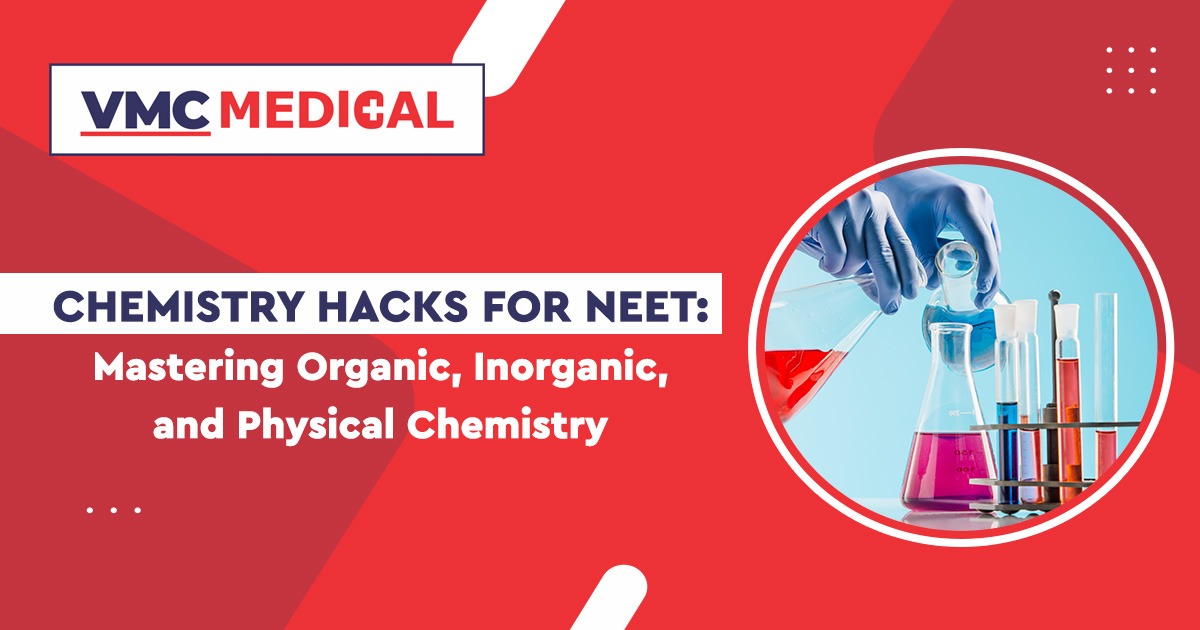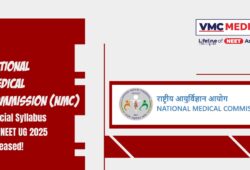Chemistry Hacks for NEET: Mastering Organic, Inorganic, and Physical Chemistry
 Posted On
Posted On
516 total views, 2 views today
Preparing for the National Eligibility cum Entrance Test (NEET) requires a solid grasp of chemistry, which is a crucial subject in the exam. Chemistry can be divided into three main branches: organic, inorganic, and physical chemistry. Each branch presents its own challenges, but with the right strategies and hacks, you can effectively master all three areas. In this blog, we will delve into some invaluable chemistry hacks to help you excel in NEET.

Organic Chemistry Hacks
Understand Basic Concepts: Organic chemistry is often perceived as complex due to the multitude of reactions and compounds. However, focusing on fundamental concepts like functional groups, reaction mechanisms, and resonance structures will provide a strong foundation.
Create Visual Aids: Organic chemistry involves spatial reasoning. Visual aids such as molecular models, reaction flowcharts, and mechanism diagrams can help you visualize complex structures and reactions, making them easier to remember.
Use Mnemonics: Develop mnemonics for remembering long lists of reactions, functional groups, and compound names. These memory aids can significantly enhance your retention and recall capabilities.
Practice Regularly: Organic chemistry is best learned through practice. Solve a variety of problems, including those from previous NEET papers and mock tests. This will help you understand the patterns and types of questions commonly asked.
Link Theory with Real-life Applications: Relate organic chemistry concepts to everyday phenomena and applications. Understanding how these concepts are relevant in the real world can make them more interesting and easier to remember.
Inorganic Chemistry Hacks
Create Concept Maps: Inorganic chemistry involves a wide array of elements, compounds, and properties. Concept maps can help you organize and connect different concepts, making it easier to grasp the relationships between them.
Study Periodic Trends: Understanding periodic trends like atomic radius, ionization energy, and electronegativity can help predict the behavior of elements and their compounds. Regularly review the periodic table to reinforce these trends.
Use Flashcards: Create flashcards for memorizing properties of elements, their atomic numbers, and key reactions. Flashcards are handy for quick revision and self-quizzing.
Focus on Coordination Compounds: In NEET, coordination compounds are often emphasized. Understand the nomenclature, isomerism, and bonding in these compounds, as they are frequently tested topics.
Relate Inorganic Chemistry to Daily Life: Similar to organic chemistry, find ways to relate inorganic chemistry to real-life applications. For instance, understand how elements are used in electronics, medicine, and industrial processes.
Physical Chemistry Hacks
Master Equations: Physical chemistry relies on mathematical equations. Dedicate time to understand and practice key equations related to thermodynamics, kinetics, and electrochemistry.
Solve Numerical Problems: Physical chemistry often involves numerical problem-solving. Practice regularly with a focus on units and conversions, and improve your problem-solving speed.
Use Visual Aids for Concepts: Physical chemistry concepts like molecular structures and reaction mechanisms can be complex. Utilize animations, interactive simulations, and diagrams to understand these concepts visually.
Understand Graphs: Interpretation of graphs and charts is common in physical chemistry. Practice analyzing and drawing conclusions from graphical representations of data.
Review Mathematics Basics: Physical chemistry often involves mathematical concepts like calculus and algebra. Brush up on these math skills to tackle advanced problems effectively.
Final Thoughts
Mastering organic, inorganic, and physical chemistry for NEET requires a strategic approach that combines understanding, practice, and creativity. By following these hacks and consistently applying them, you can not only overcome the challenges of chemistry but also excel in the subject, setting yourself up for success in the NEET exam and beyond. Remember, the key is to stay persistent, stay curious, and approach each topic with enthusiasm.




